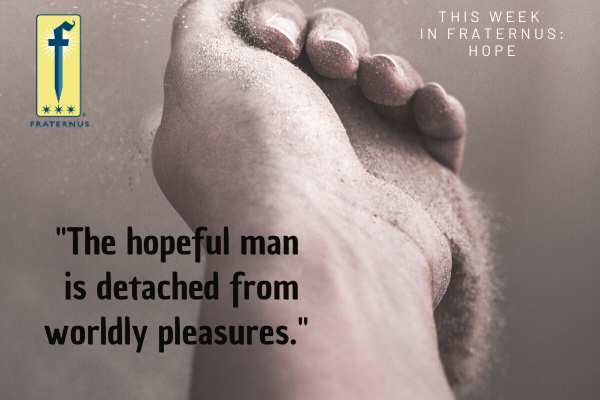The Hopeful Man is Detached from Worldly Pleasures

nothing good is good enough
- by Chris Fernandez
Jason Craig’s Article What’s Wrong with the ‘Pursuit of Happiness,’ from the 2nd Sunday in OT is applicable here, and a good reference. This article clarifies what consists in true happiness: Freedom for the Good. “To be happy is to seek God and virtue in relation to the order of grace.” Jason quotes Aquinas in emphasizing that because “we have an appetite for eternal truths, it is ‘impossible for any created good to constitute man’s happiness.’ Only God can.” Jason points out the interesting reality that freedom in God comes “at the price of our individual liberty” because it requires a submission to the law of God. However, this submission is not simply one of justice, but one of charity, of love, of the intimacy of a beloved son. It is in submitting ourselves to God as His sons that we allow Him to love us as Father. This is the reality in which our hopes rest, our adoption as beloved sons by God, our eternal and loving Father.
In the letter to the Romans, the author speaks of how we hope for that which we do not yet see, for that which we cannot yet perceive with our eyes to be realized. In hope we await for when “creation itself would be set free from slavery to corruption and share in the glorious freedom of the children of God…. we also groan within ourselves as we wait for adoption, the redemption of our bodies.” (Rom 8: 21 & 23) However, this groaning is not simply left as an ache for some unfulfilled desire, but a faith in the ultimate fulfillment of our desire, because the author of this promise is trustworthy. Christians have a distinguishing mark, the fact that they “have a future: it is not that they know the details of what awaits them, but they know in general terms that their life will not end in emptiness. Only when the future is certain as a positive reality does it become possible to live the present as well.” (Benedict XVI, Encyclical Letter, Spe Salvi, Par 2)
While it is appropriate for us to attend to responsibilities and realities at hand, do we approach all with an ordered heart, free of attachments? This core goal and desire of the redemption of our bodies, and our adoption as sons of the Father must be given a primacy in our hearts. It is certainly a temptation to be drawn towards lesser things as this goal seems to fade off in the distance, we become entertained and distracted by lesser, but more immediate and tangible goods. As the challenges of life wear upon us, it is also easy to look to other goods for some more immediate satisfaction, but apart from God no other good satisfies. All goods must be received as gifts from the Father – in freedom – that they may draw us ever closer to the Giver of the gift. Receiving a good in and of itself leads only to dissatisfaction; the luster and delight, the joy promised to us by our thoughts in anticipation of receiving the good only fades to disappointment after we have attained it.
Pope Emeritus Benedict XVI writes that “we have been given hope, trustworthy hope, by virtue of which we can face our present: the present, even if it is arduous, can be lived and accepted if it leads towards a goal, if we can be sure of this goal, and if this goal is great enough to justify the effort of the journey.” (Benedict XVI, Encyclical Letter, Spe Salvi, Par 1)
What goal could be more great and worthy of our effort than that of an eternity with God in Heaven? We are invited into an eternity of happiness, the fulfillment of our hearts, where our will finally come to rest, no longer compelling us towards any other object. No other goal can offer an infinite reward in return for a finite ordeal.
The Imitation of Christ by Thomas à Kempis:
Affection for creatures is deceitful and inconstant, but the love of Jesus is true and enduring. He who clings to a creature will fall with its frailty, but he who gives himself to Jesus will ever be strengthened.
Love Him, then; keep Him as a friend. He will not leave you as others do, or let you suffer lasting death. Sometime, whether you will or not, you will have to part with everything. Cling, therefore, to Jesus in life and death; trust yourself to the glory of Him who alone can help you when all others fail.
Catechism377: The “mastery” over the world that God offered man from the beginning was realized above all within man himself: mastery of self. The first man was unimpaired and ordered in his whole being because he was free from the triple concupiscence that subjugates him to the pleasures of the senses, covetousness for earthly goods, and self-assertion, contrary to the dictates of reason.
Share This Post


